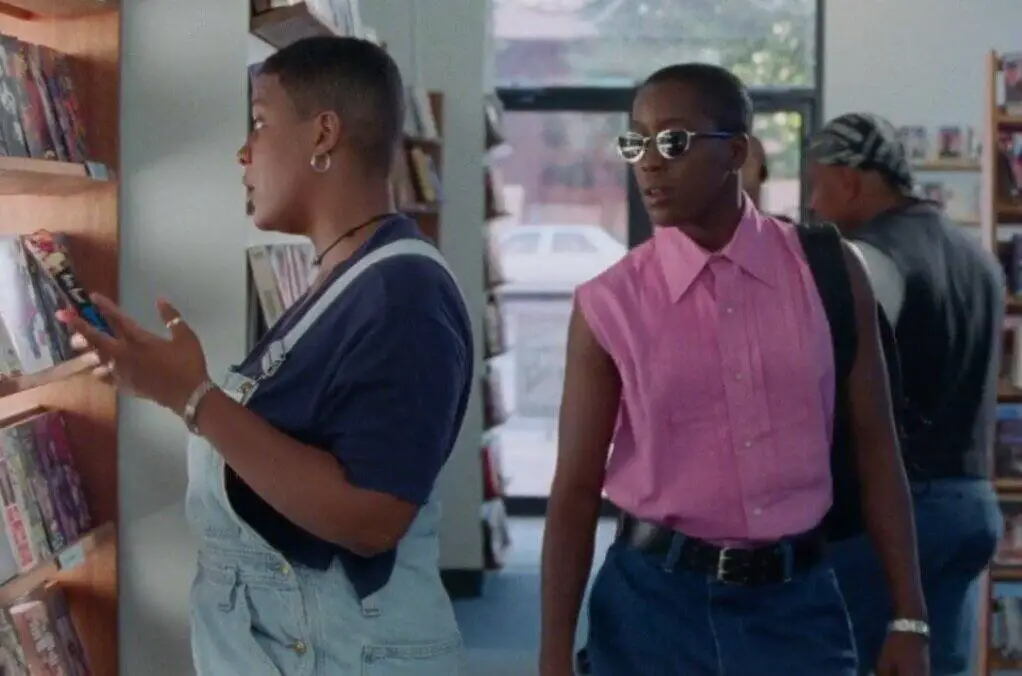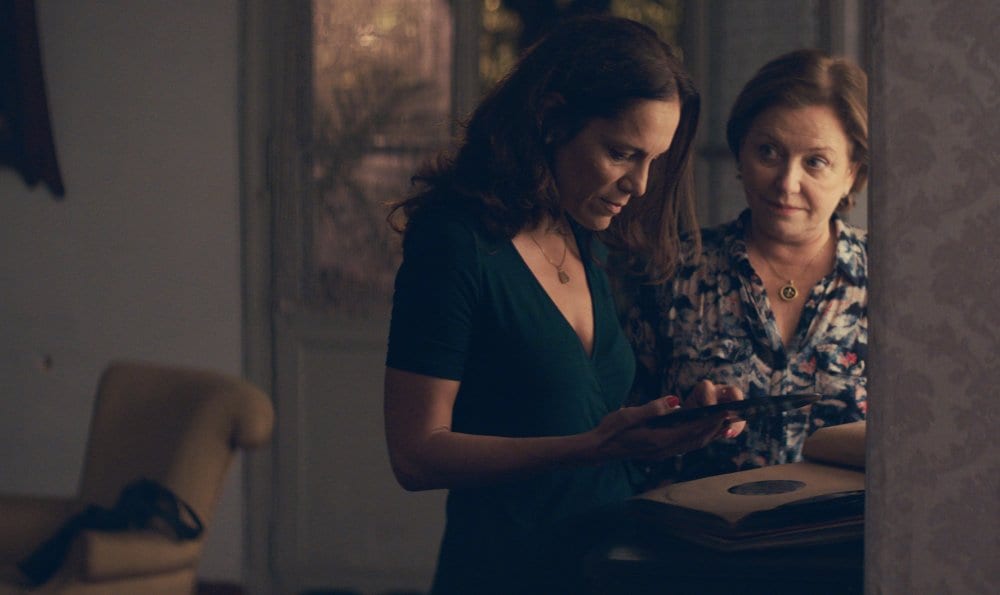The Watermelon Woman
It’s interesting how going into a movie knowing nothing about it can change your perspective on it. For almost the entirety of the running time of The Watermelon Woman, I was surprised by the story being told and that I had never heard of it or any of these people before. It wasn’t until I got to the end credits that the penny finally dropped. The so-called “Watermelon Woman” did not in fact exist, rather she is a fictional emblem to make the subject of Cheryl Dunye’s mockumentary about the standing of black women in the 20th Century’s entertainment industry, specifically of black lesbians in Philadelphia. To this end she shot fake early movie footage and staged interviews, including with Camille Paglia playing a parodic version of white feminist academia. How convincing any of these moments manages to be is highly variable, playfully deconstructing the barriers between fact and fiction, and moreover, the cultural narratives each character is subscribing themselves to.
Presented as a documentary – though including more clearly fictional and purely dramatic scenes showing Cheryl’s relationship with her best friend Tamara and new girlfriend Diana – the film follows Cheryl’s attempt to uncover the story behind this enigmatic figure from early American cinema, after being enchanted by her performance in an old movie. This ends up being a rather deft conceit allowing her to unearth a wealth of compelling historical details. Although the specifics are made up, clearly the broader facts are true, and the long-lost cultural moment in which such women privately thrived is evoked with a nostalgic yearning.

Some moments play fast and loose with the messaging a tad. For example, we’re invited to roll our eyes at Cheryl’s black lesbian friends and their depressing prejudice against her middle class white bisexual girlfriend, but the story then kind of proves them right by having her history with black men appear to come between them anyway. It almost feels hypocritical given the way the film itself lavishes over the subversive image of the interracial lesbian couple. It’s certainly true though, that the film never takes itself too seriously, poking fun at Cheryl and her friends and the ways feminist culture unreflectively reproduces the same hierarchical mentalities it was created to oppose. It becomes difficult to infer any kind of mean-spiritedness from the film though, as it seems so consistently funny, irreverent and good-natured. More than anything else, it’s this wry, personable guilelessness and—despite its crusade—lack of self-importance, that makes the film such a joy.
Booksmart
Another in a long line of coming-of-age movies about socially awkward teen girls, this may seem a mile away from something like Eighth Grade, but what the two films have in common, and it’s exactly this quality that makes me so affectionate towards them, is their empathy. This film recalls something more like The Breakfast Club, where all the different tribes in the high school come together and mutually realise just how clueless they all are and that none of them were as alone as they have always felt. This is a much more upbeat and irreverent film than Eighth Grade or even The Breakfast Club but still has a lot of heart and sincerity to it.
The film follows Molly and Amy, two high school bookworms who, realising that they have wasted their high school years studying instead of cultivating their social lives beyond each other, resolve to make up for lost time in their last night before graduation, resulting in a party crawl with the end goal of hooking up with their respective crushes. That one of these crushes is a girl is almost irrelevant to the story, in one of the more refreshing examples of unmannered representation. There is a strong thematic thread that emerges from the character’s sexuality though, as it ties in to the most consistent message of the film, that people are rarely who they appear, or the sum of what they choose to appear as.
Every single character has a surprise in store, initially appearing like a stock character, down to the last, they have more depth to reveal. Although flawed and with the potential to have been very annoying, the characters are all good people and very lovable. I’ve been saying that Kaitlyn Dever needs to become a star since Short Term 12, but this is a movie where everyone deserves to be famous in the future. These kids are hilarious, charming, distinct, and have real acting chops as well, all of them. Aside from Dever and Feldman I also want to give special mentions from the ensemble to Billie Lourd and Skyler Gisondo as the dissolute rich kids on the quad who provided the movie with its funniest and more unexpectedly, it’s most moving moments. It’s exactly this sort of way that the movie and its characters surprise you that makes it so endearing.
There are a lot of jokes that the movie crams into its run time, the film does keep up a terrific pace, and not all of them kill, though the only real clanger is a misjudged and overlong drug trip scene). That minor blip aside, this movie is a lot of fun, very charming and energetic and endearing and what makes it really work is the love between the main characters. From the very start they totally feel like they are old friends and by the end they’ve become yours too.
The Heiresses
The sadly overlooked 2018 drama The Heiresses is a touching Paraguayan tale of class and emancipation and was also one of the most female films I had ever seen at the time. Like Portrait of a Lady on Fire, the film hasn’t a single named male character who is more than glimpsed or remains offscreen while discussed by women. The film follows a wealthy middle-aged woman named Chela (a deeply poignant performance from Ana Brun) learning to walk alone after her partner of 30 years, Chiquita, is imprisoned for fraud and who gradually falls for an empowered, sexy younger woman (Ana Ivanova). It’s another film that constitutes a sort of coming-of-age narrative, yet one that feels all the more moving and profound for how late in life that coming arrives. Unusually though, it’s not a story of a late-life coming out, as you’d see in a film like Beginners, Chela’s lesbianism is the one part of herself she sees comfortable asserting. One can easily imagine her adolescence: falling for Chiquita – perhaps losing family connections as a result – who began making all their joint decisions on her behalf, with Chela slowly backsliding into dependence on her.

The film has a slow, tentative pace, mirroring the characters baby steps towards a full life and is often infused with a tender sadness as she peers timidly through doors left ajar at the object of her desire or her own possessions being auctioned off to pay her partner’s debt. The film holds a real fascination in living in the under-explored world of the Paraguayan idle rich and deprived ghetto-like prisons, each holding their own communities and stresses, and there are some great audio edits melting the clamour of the prison yard into the chattering of an octogenarian bridge game. The film makes some subtle use of class and racial issues with Chela’s long suffering and illiterate Mestizo maid proving herself especially adept at reading people, and her comforting presence provides some of the film’s most touching moments. Although slow paced and subtle, the film weaves its gentle spell with a quiet potency, finally building to what is low-key one of the most cathartic and joyful endings in recent memory.



